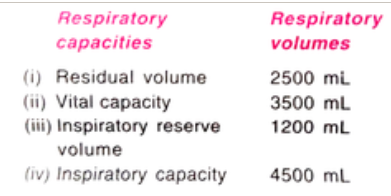Listed below are four respriatory capacities (i-iv) and four jumbled respiratory volumes of a normal human adult

(ii) 2500 mL, (iii) 4500 ml
(iii) 1200 mL,(iv) 2500 mL
(iv) 3500 mL , (i)1200 mL
(i) 4500 mL, (ii) 3500 mL
The correct Answer is:C
Step by step video & image solution for Listed below are four respriatory capacities (i-iv) and four jumbled respiratory volumes of a normal human adult by Biology experts to help you in doubts & scoring excellent marks in Class 12 exams.
Updated on:21/07/2023Topper's Solved these Questions
- BREATHING AND EXCHANGE OF GASES BOOK - AAKASH SERIESCHAPTER - BREATHING AND EXCHANGE OF GASES EXERCISE - EXERCISE-II (Miscellaneous )
4 Videos
- BODY FLUIDS AND CIRCULATIONBOOK - AAKASH SERIESCHAPTER - BODY FLUIDS AND CIRCULATIONEXERCISE - Exercise -III (Previous AIPMT/NEET Questions)
35 Videos
- CHEMICAL COORDINATION AND INTERGRATIONBOOK - AAKASH SERIESCHAPTER - CHEMICAL COORDINATION AND INTERGRATIONEXERCISE - Exercise-III (previous AIPMT/NEET questions)
41 Videos
Similar Questions
listed below are four respiratory capacities (A-D) and four jumbled respiratory volumes of a normal human adult
Respiratory capacities− Respiratory volumesResidual volume− 2500 mLVital capacit− 3500 mLInspiratory reserve volume− 1200mLInspiratory capacity− 4500mL
Which one of the following is the correct matching of two capacities and volumes
View SolutionThe quantity 1100-1200mL in the respiratory volumes of a normal human adult refers to
View Solution
Knowledge Check
Listed below are four respiratory capacities (i-iv) and four jumpled respiratiory volumes of a normal human adult.
Respiratory volumes and capacitiesVolume of air(i)Residual volume1200 mL(ii)Vital capacity4500 mL(iii)Inspiratory reserve volume2500 mL(iv)Inspiratory capacity3500 mLA(ii)2500mL,(iii)4500mLB(iii)1200mL,(iv)2500mLC(iv)3500mL,(i)1200mLD(i)4500mL,(ii)3500mLGiven below are four statements (i-iv) regarding human blood circulatory system
(i) Arteries are thick-walled and have narrow lumen as compared to veins
(ii) Angina is acute chest pain when the blood circulation to the brain is reduced
(iii) Persons with blood group AB can donate blood to any person with any blood group under ABO system
(iv) Calcium ions play a very important role in blood clotting
Which two of the above statements are correct ?A(i) and (iv)B(i) and (ii)C(ii) and (iii)D(iii) and (iv)Given below are few respiratory disorders. Identify occupational respiratory disorders among these.
(i) Coryza , (ii) SARS
(iii) Silicosis , (iv) Asbestosis
(v) EmphysemaA(i) and (ii)B(i) and (v)C(iii) and (iv)D(i),(ii) and (v)
Define the following and give their values in a normal human adult
Tidal volume
View SolutionDefine the following and give their values in a normal human adult
Inspiratory capacity
View SolutionGiven below are four statements (i-iv) regarding human blood circulatory system
(i) Arteries are thick-walled and have narrow lumen as compared to veins
(ii) Angina is acute chest pain when the blood circulation to the brain is reduced
(iii) Persons with blood group AB can donate blood to any person with any blood group under ABO system
(iv) Calcium ions play a very important role in blood clotting
Which two of the above statements are correct ?
View SolutionDefine the following and give their values in a normal human adult
Expiratory reserve volume
View SolutionList four effects of alcoholism on human health
View Solution
